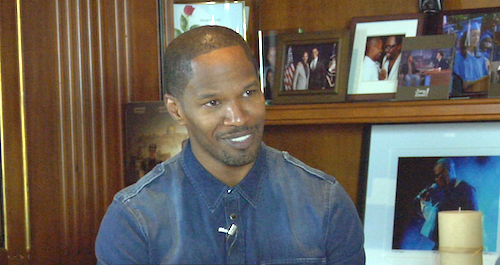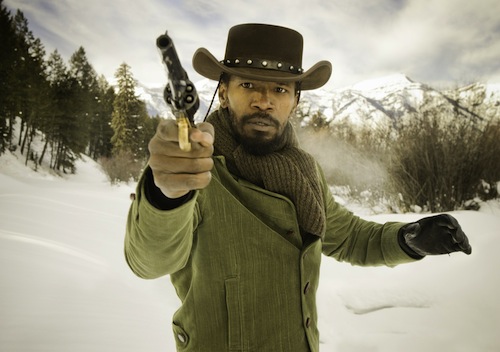
Jamie Foxx being interviewed at his home
VIDEO: Jaime Foxx interviewed by Brandon I. Brooks for LA Sentinel TV (LASTV)

A scene from Django Unchained

A scene from Django Unchained starring Jamie Foxx.
Jamie Foxx stars in Django Unchained.

Jamie Foxx plays Django in Django Unchained.
The Sentinel/Watts Times (and Black Press of America) sat-down for an exclusive one-on-one interview with Academy Award-winning actor Jamie Foxx, at his home in Westlake, California. Foxx opened-up about the blockbuster film Django Unchained, and why he took on the role of Django, a slave turned bounty hunter.
By Brandon I. Brooks
Editor
VIDEO: Jaime Foxx interviewed by Brandon I. Brooks for LA Sentinel TV (LASTV)
Academy Award-winning actor Jamie Foxx gives one his most powerful performances on the big screen with his portrayal of Django in Django Unchained.
Foxx plays a slave turned bounty hunter, who gets the rare opportunity to seek revenge against white slavers and bad men, while searching for his captured slave-wife, Broomhilda, played by the beautiful actress Kerry Washington.
Written and directed by Quentin Tarantino, Django Unchained stars Jamie Foxx (Django), Leonardo DiCaprio (Calvin Candie), Samuel L. Jackson (Stephen), Christoph Waltz (Dr. King Schultz), and Washington.
Opening second at the box office,Django Unchained has received mixed reviews since its release. The most notable and harshest critique of the film comes from veteran movie director and writer Spike Lee, who has called for a boycott of the film.
Lee commented on the film via twitter saying, “American Slavery Was Not A Sergio Leone Spaghetti Western. It Was A Holocaust. My Ancestors Are Slaves. Stolen From Africa. I Will Honor Them.” Lee made these comments even though he has yet to view the film.
Kam Williams, Sentinel and Watts Times movie critic, is on the other end of the spectrum giving the Django Unchained four out of five stars. Williams writes, “Slavery is reimagined as a messy splatterfest where massa gets exactly what he deserves and then some!”
Django Unchained has sparked a debate in the Black community and left many mixed feelings and it has brought to life discussions on the topic of Black slavery which is a taboo subject in American history and its educational system.
There is no mystery that Black slavery is under-analyzed by Hollywood and mainstream media. The most memorable glimpse and realistic portrayal of Black slavery on film would be the classic mini-series Roots, starring LeVar Burton. The Roots mini-series brought the horror of slavery into the living rooms of millions.
For the first time in recent history, the subject of Black slavery takes center stage as the backdrop of a major Hollywood picture. Unfortunately, Tarantino’s film and Foxx’s portrayal of Django could not have come at a more critical point in American history because gun-control is once again a hot button debate in Washington.
Because of the intense buzz surrounding Django Unchained, the Sentinel and Watts Times had to reach out to Foxx and get his take on the project. We caught up with the superstar actor for an exclusive one-on-one interview at his home in Westlake, California.
Sitting down in his living room, Foxx shared that he first-heard about the film on the internet AND that Will Smith had the role. Foxx said that he was upset that he didn’t get a chance to read for the part. However, soon after hearing of the movie, Foxx had a management shift and got the opportunity to read the script.
After reading the script, Foxx said he didn’t have a knee-jerk reaction to the word “Nigga”, which is used obsessively in the film.
“Me being from Texas, I didn’t knee-jerk like someone from New York would or someone from L.A. would because when you live in Texas or you live in the south, there is a racial component that we live with,” said Foxx.
“I love the south, but there were several moments when I was called the “N” word so I didn’t knee-jerk to that.”
Foxx chose to lock-in on the love story between Django and Broomhilda. He shared that the heroicness at the very end of the movie, where Django actually lives, sold him on the film.
“The slave actually picks up arms, becomes this bounty hunter, and wins in the end,” said Foxx.
“And the other aspect, me being from Texas it was cowboys, Iwas riding horses. Back when I was a kid, watching Bonanza was the thing and watching these iconic White cowboys, we never got a chance to play on a big scale. So when I got a chance to meet with Tarantino, I shared a lot of private things that happened to me when I was a kid.”
It’s rumored that Hollywood heavy weights such as Will Smith, Idris Elba, Terrence Howard, Anthony Mackie and Lorenz Tate were up for the role. When Foxx met with Tarantino to discuss his opportunity to play the role, he said he knew whoever got the part would be brilliant.
“All of these guys could have done it and that’s a testament to the amount of Black talent we have in Hollywood today,” said Foxx.
Foxx felt he was meant for the part because he could not only play the part but the “articulation of the work afterwards.”
“I would hate to be in the theater watching the film and I am not in the film.”
When asked how Black people should react to some of the atrocities captured during filming Django, Foxx said, “You are not supposed to feel good when those words are being said. You are not supposed to feel good when a slave is being eaten by dogs; you are not supposed to feel good when a Black woman is being whipped. What I will say is this… is when you are talking about the Holocaust, every two or three years there is a movie about their history. When you talk about slavery, it’s so taboo, it hurts so bad even to mention it, that we don’t even want to touch it.”
“I felt like this, for what this movie can do especially for now and 10 to 20 years from now what it will do, it will open up our eyes differently.
If it’s successful that means a movie about our history at the end, you win and that can set us up for a long time to go back and talk about certain things.”
Foxx went on to say there is educational value in the film. Most of the film took place on plantations in Greenville, Louisiana. When Foxx met fans while filming in New Orleans and shared with them he was going to Greenville to film on actual plantations they would respond, “Where is that?”
Foxx had to tackle the subject with his own children as he took his two daughters (18 and four) to the set. “My four year-old just ran, jumped and played and had a good time which is probably what a lot of young slave kids did at the time,” said Foxx.
“They didn’t know how bad their situation was. But my 18 year-old was stunned. 7,000 names of babies that were killed on the plantation because when a Black woman would have a baby, the slave master would say, ‘so how are you going to pick cotton?’ So he killed the baby.
So the atrocities that you see in Django Unchained, it’s not even close to how it really was. But I think it’s necessary for us to see that. It’s necessary for Django, at where I thought was the most difficult part of the script, was when the dogs eat the Mandingo and tear him apart but Django has to play this slaver character and be someone else (undercover). But to see him deal with that and his partner from Germany dealing with, ‘this happens?’ And to have Django say, ‘this happens every day’.”
The “N” word was tough to deal with on-set. In rehearsal, Washington and Foxx asked for the word to be used. DiCaprio who plays the slave-owner at Candyland, stopped while filming because saying the word was affecting him emotionally. “You should feel affected by it,” said Foxx. “You are not human if you don’t.”
Jackson pulled DiCaprio aside and said, “Aye Mutha*****, this is just another Tuesday for us.” Jackson and Foxx expressed to DiCaprio that if he did not go there, to be that evil person, that they did not have a movie.
“When you are doing a movie like this you go beyond Django,” said Foxx who suffered from a lack of sleep during the nine-month filming process. He and Washington became close because they had to experience the journey on and off camera.
Music played an integral part on and off camera helping the cast push through the most difficult scenes. Foxx helped produce a song with rap star Rick Ross titled 100 Black Coffins for the soundtrack. Foxx came up with the hook for the song while filming on set.
When the character Broomhilda received lashes, Foxx said that he calmed the cast and crew with a hymn by gospel singer Fred Hammond that sang, “No weapons, formed against me, shall prosper, it won’t work.” It’s important to note that Washington asked to receive real lashes while filming. They of course used a modified whip but she did however receive real whips.
Foxx shared that he witnessed an extra onset, raise their hands to testify and then hug a nearby child. The entire set from the grips to the lighting crew all experienced something personal during the dramatic lashing scene. Even director Quentin Tarantino got teary-eyed while filming through the lens. Foxx shared that he felt the “ancestors stepped-in” and allowed this to happen.
“It was a huge journey. It was tough and there was always those moments where you feel like you don’t really want to mess this up. This was like a gymnastics routine at its highest difficulty with all the spins and all the twists. If you land it great, if you don’t, then you are in hell.”
When asked if Django is a superhero, Foxx responded by saying, “I think so.”
He says that they will more than likely do another Django (Django Unchained Part 2) where Broomhilda will get involved with the Underground Railroad and write books in Philadelphia. Django will move up north, where he is hiding out. All through the south there are wanted posters for Django. But no one knows what he looks like because at that time there were no photos or pictures of Django.
“Whenever I do anything, as a Black artist, if Black folk aren’t behind it or happy about it, I feel in a certain way I failed,” said Foxx.
“Now at the same time, I have to be challenging to my Black audience because I am moving as an artist. But I always come back to that. I know Black people. I know where they sit. I know what makes them cringe. I know what makes them cry. I know what makes them yell.”
The Los Angeles Sentinel and L.A. Watts Times would like to send a special THANK YOU to Alex Avant for coordinating the interview. We would also like to thank Jamie Foxx, Hollywood’s Number 1 Black Actor for making himself accessible to the Sentinel/Watts Times and the Black Press of America.







